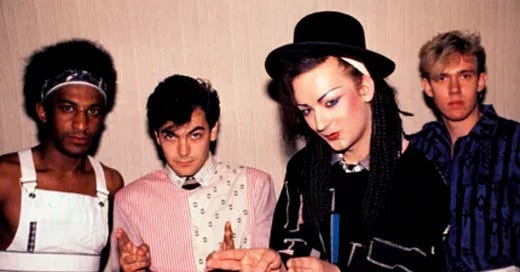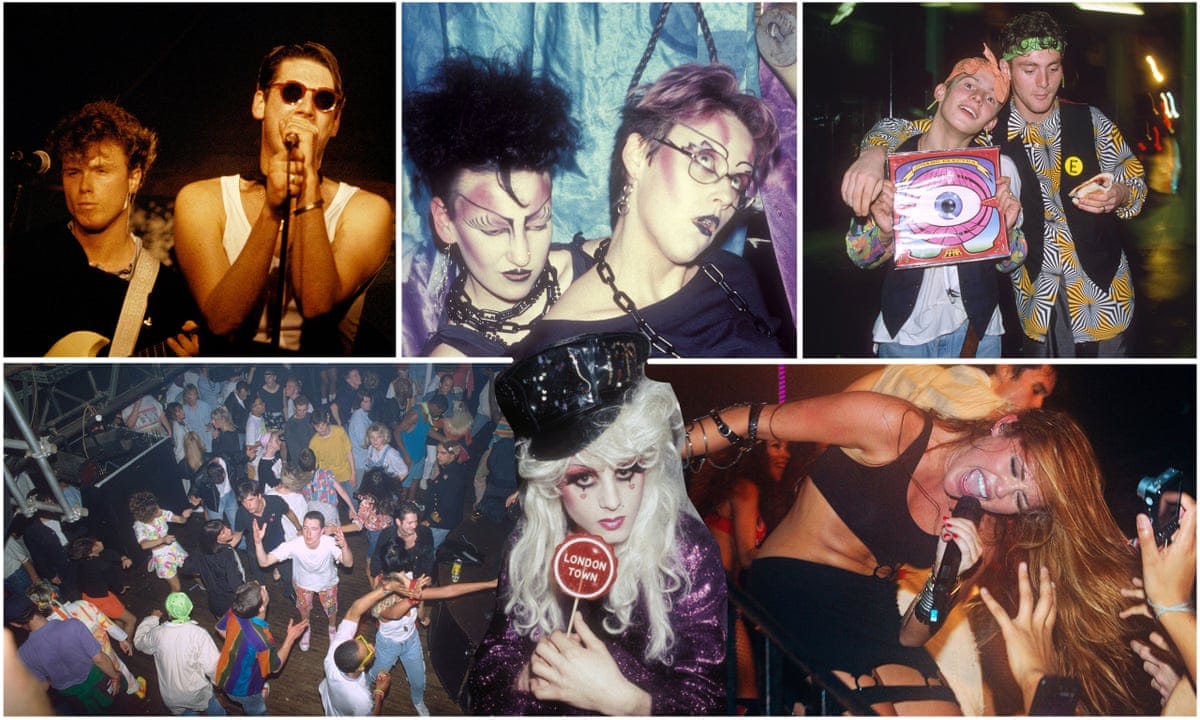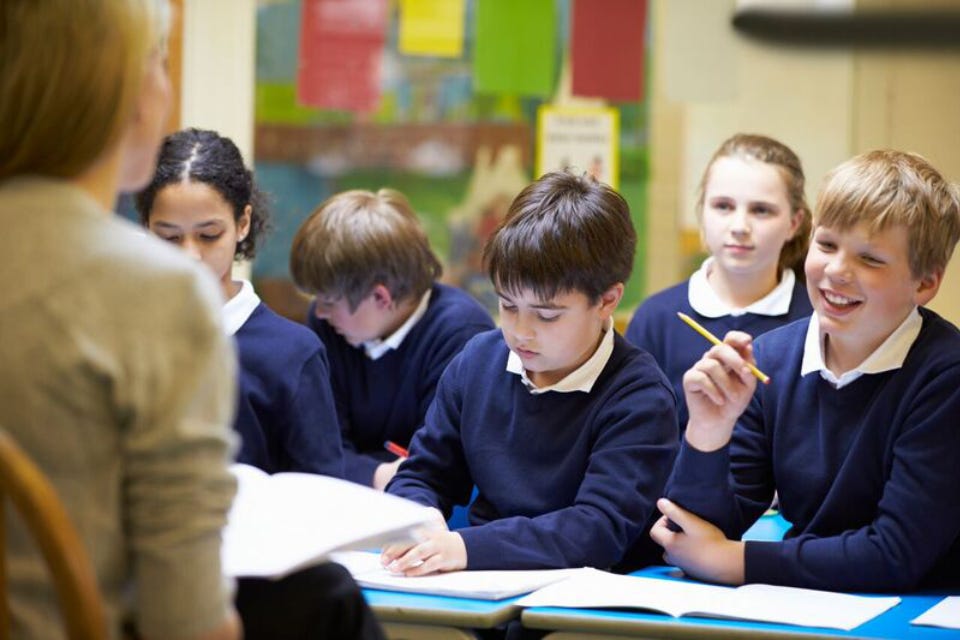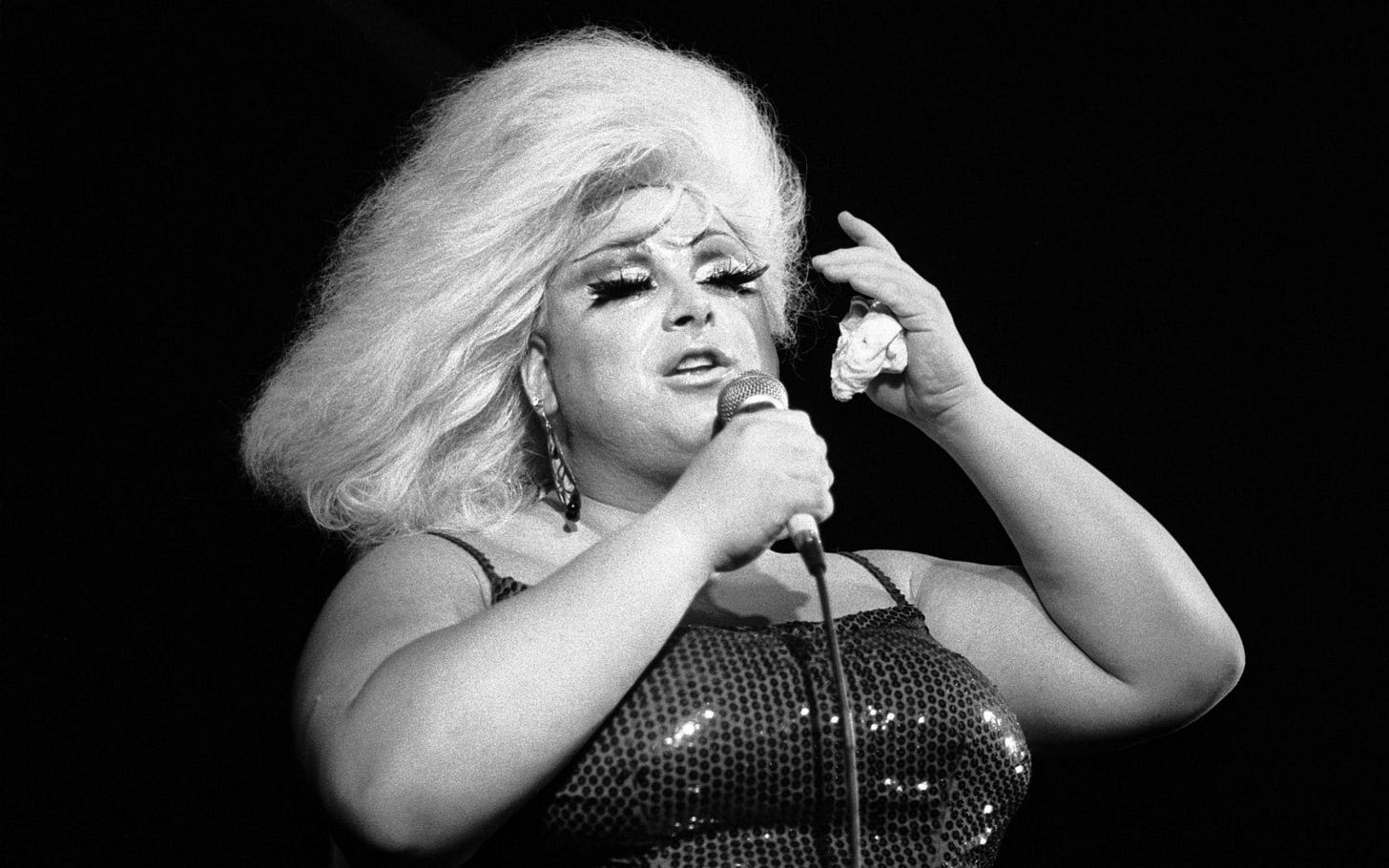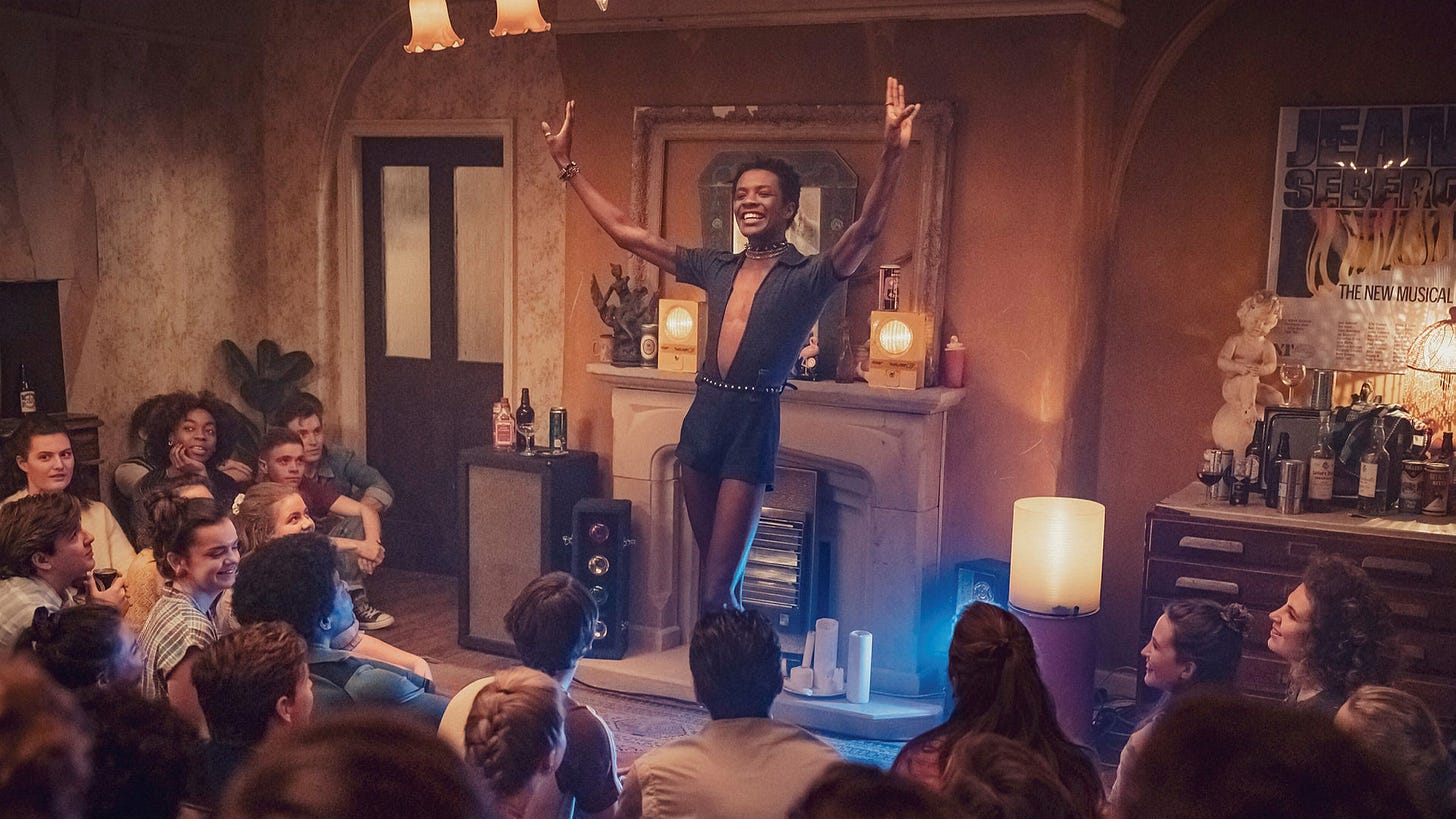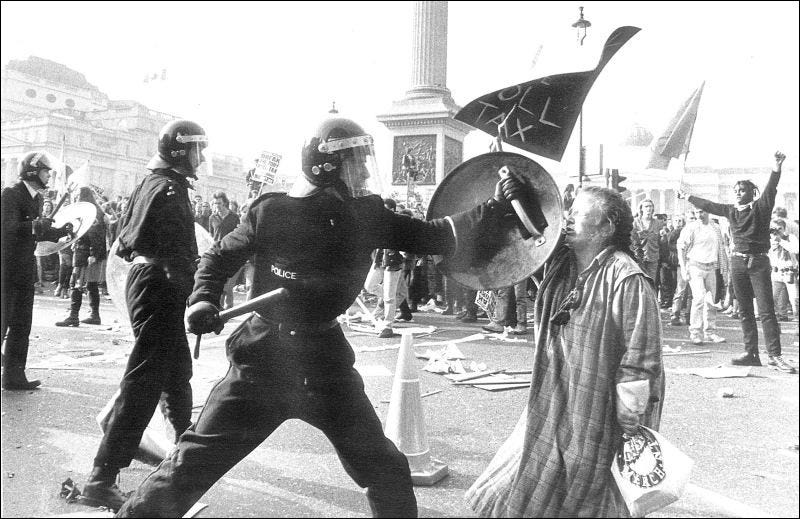The 'Glorious' Gay 80s?
Why do so many queer men today glorify the cultural fabric of the 1980s- the very era of AIDS, Abuse, and Authority?
How many times have you found yourself enjoying a night out, perhaps throwing it back to Madonna or some Eurythmics, only for one of your friends to take a look up from his iPhone and say-
“God, I was so born in the wrong generation; I just know I’d absolutely kill it in the 80s!”
Something tells me that as he’s swiping his way between Grindr, Uber and Deliveroo, puffing away on his Blue Razz Lemonade disposable vape, he’s not actually given much thought about how life in the 1980s would really quite work out…
Images from Heaven nightclub form the 1980s (and Miley Cyrus in 2010) - the vibrancy of 1980s club culture has permeated through to today, leaving a lasting image of what gay life was seemingly all about- but what was the reality (The Guardian)
Sure, life isn’t exactly so cosy right now in 2024. We’re all guilty of burning the TK Maxx candle at both ends just to get by at the minute. Throw in a couple heatwaves, fruitless hunt for a (semi-)affordable flat, and search for an entry level job that doesn’t require 35 years experience, my own Brat Summer turned into a Breakdown Summer pretty swiftly.
Even with all that included, I think it’s safe to say I should be counting my blessings that life as a queer man is still head and shoulders above that of 40 years ago. I’m able to lie in the bed I share with my boyfriend; in a room full to the brim of books on queer theory, culture and history; typing away on my silly little laptop as I study for my silly little publicly funded Queer Performance postgrad degree; putting it out on public forum safely and openly. 40 years ago, chances are my relationship would have to be kept very much a secret for fear of our landlord evicting us at will; lucky enough to find a handful of publicly available books to fill these shelves let alone an entire university degree; and certainly would have to second, third and fourth guess putting my thoughts out there publicly for fear of my own safety. This is all without mentioning the mysterious growing epidemic looming over everybody’s heads and a government more than willing to look the other way.
There is still work to be done, and minds to be changed, at home and abroad, especially for our trans and non-binary community. But overall, life is just better for queer men now than it has been ever before. I mean, come on; back then if you were bored you could flick between BBC1, BBC2 and ITV. Now you could flick between DomTop69, Unnamed Headless Torso and NoTapsPlz just as quick- all while ASOSing your next friday night outfit.
So what gives? What the hell is our community’s obsession with glorifying the 80s as ‘the golden age’ of gay culture?
EDUCATION
‘“Positive step for LGBT inclusion” as RSHE guidance published’ (gov.uk, 2019)
It probably all comes down to what we know about the 80s.
After all, it’s; “William, William, Henry, Stephen, Henry, Richard, John…” NOT “Thatcher, Reagan, Miners, Cold War, Moscow, AIDS and War”. We simply don’t get taught nearly enough about life in the 80s at school. I’m not saying Henry VIII’s wives and the Georgian Era are boring, otherwise we wouldn’t have SIX: The Musical or Bridgerton without it (or that amazing Drag Race lip sync and Jonathan Bailey in a sopping wet… shirt… for that matter)!
Try convincing a school board or our parents that the generation where most of them could vote, drink and get married should be included in ‘history’- and you may get a slap to the chops. And that’s just the 80s. Section 28 -the law that essentially criminalised any talk of LGBTQ+ issues in the classroom- didn’t end until 2003, and most teachers are still to this day sceptical of touching the subject out of prejudice, fear of retaliation, or genuine ignorance. Remember, most of our teachers would’ve left school while this draconian rule was still in full effect. Change might be just around the corner, but for now all we can rely on is what we’ve been taught ‘round the dinner table or from our TV screens.
Unless you’ve got a fruity family member, or progressively minded parents, it’s highly unlikely that the topic of ‘gay life in the 80s’ ever popped up over Sunday dinners at Nan’s house. Realistically, all we’ve been left to reckon with is ol’ reliable: the media…
For me, the impression of what life in the 80s was like came from old reruns of Fawlty Towers, Only Fools and Horses, Pretty Woman and Eastenders. I was lucky to have an aunt who would quite often babysit and show my sister and I a whole host of films, and tell us about what her life in 1980s London was like, even once casually dropping into conversation one morning how she ‘used to go vogueing in Soho back in the day’- but even that doesn’t paint the full picture for how things truly were.
This is great and all. But what makes us foam at the mouth about the 1980s so much that we’ve collectively managed to look past AIDS, Authoritarianism, and Adversity?
Let’s take a look at the itty-bitty puzzle pieces of what we do know, or at least think we know, about the decade of excess and INXS, and see how we’ve managed to piece them together to create an image of the Great Gay Eighties:
MUSIC
Divine performing at Heaven nightclub 1981 (The Telegraph)
Maybe our twink friend has a point; we could absolutely slay in the 80s. It’s hard to deny that these years supplied some of the best music that’s lasted through to the dance floors of Heaven and Two Brewers to this day. School runs are still accompanied by BBC Radio 4’s ‘Sound of the 80s’ (probably designed to help parents cope by injecting them with enough serotonin before reaching the school gates), and vintage Top Of The Pops episodes still get prime time on Christmas Eve. Having an uplifting soundtrack of defined synth beats and electro drums helps us feel a sense of joy, and the 80s were certainly full of that.
A decade of MTV, The Tube, the Music Video, and in-yer-face mass-marketed individuality, 80s pop music is like a homing signal to the queer man, and has filled our culture ever since. Of course, queer musicians (open, closeted, and ambiguous) were around before, with artists such Sylvester, Elton John and David Bowie (debatable) making way in the 70s; but the 80s were truly the era of pushing the envelope, making the whole decade a testing ground for what made up ‘the gay sound’. Just watch any gay film or TV show set in the era, like ‘It’ a Sin’, ‘Pride’, ‘All of Us Strangers’, and you’ll find soundtracks full of Pet Shop Boys, Divine, Bronski Beat, and Frankie Goes to Hollywood: music created by and for gay men. Camp and sweat were here, and it was queer.
It was a decade when being gay wasn’t only a label, it came into its own as an identity; something on which you could -unashamedly- base a lifestyle. As the years went on, with a society and a government working tirelessly to push them down; ostracised by family, healthcare and employment; and a wild and mysterious disease with no known cure spiralling out of control through the community: rather than lie down and take it, the scene found its spirit, buoyed by the revolutionary sounds of high bpm; determined to fight harder, and party harder at that.
FASHION
‘It’s A Sin’ (BBC1 2021), examples of 1980s gay fashion as shown on modern TV (Grazia)
Fashion in the 80s was… questionable.
But fret not, my friends. As you pick through your wardrobes on a friday evening for a Zara tank top, or CloneZone harness (again); just remember that the decade was not all spandex and tutus in sickly shades of neon green (sorry, Charli, you weren’t the first to find this colour). The 80s were in fact a remarkably beige-heavy time, full of flammable sticky plastics and polyester. Rather, that’s how it was for most people, day-to-day. But we’re not talking about the day-to-day; we’re talking about gay fashion.
Just like music, the 80s became the era for gay men to reinvent their identities to match who they were on the inside, and what they wanted others to imagine them taking off…
The era of tight jeans, tight shirts, slicked back hair and tight (or no) underwear had arrived!
Take a look through the archives, footage of Heaven nightclub in ‘85, or the ball events of Harlem in ‘89; and you’ll see a world of, well everything. Individuality and difference was a cornerstone of queer fashion, at least where it was safe. This is what’s been remembered and documented, not plain plimsolls and boring t-shirts.
A SIMPLER LIFE
1990 Poll Tax Riots culminated a decade of social, economic and political upheaval in Thatcher’s Britain (Socialist Party)
“We’ve had Brexit and Covid. We don’t need you here”
Arguably the best line to come out of Eastenders since “yOu AiNt mY mOtHaA!” “yEs i aM!”. But it holds true. We’ve not long come out of a pandemic, had our lives turned upside down by leaving the EU (whichever side of the aisle you find yourself, you cannot deny it’s all been a bit of a sloppy mess), and been through so many ups and downs that even a mouldy cabbage outlasting a mouldy Prime Minister no longer makes the top 20 of the most bizarre occurrences to happen in our lives this last decade. With economic woes draining our wallets, a housing crisis, austerity, war, race riots here, there and everywhere; life at the minute has been utterly and depressingly, well… depressing.
It’s easy to hark back to a time, perhaps our childhood, when ‘things were simpler’ when we’ve had the runaround we’ve all been through. Or even better yet, a time before we were even born. Perhaps a time we’ve only seen glorified as simple, calmer, more joyful than our own… See where I’m getting at?
The 1980s had their fair share of turmoil, too. In fact, the decade has often been called ‘the decade Britain tore itself apart’. Poll riots, austerity, recession, high unemployment, the Cold War, a right-wing former celebrity in the White House, violence in Northern Ireland. Sounds pretty similar to today, no? So why do we often reminisce about the 80s as a time of peace, calm, and prosperity? Because it was, for some people. It was the time when the rich got richer and the underdogs were left sleeping in leaky kennels. That’s not quite how TV sees it, oh no no no.
TV and Film from the 80s had a vested interest in showing the brighter side of life. A reason to draw people in, make them hope for something better, to buy, buy, buy. What’s left behind is a collage of adverts for toothpaste, council houses on the market and Dallas diamonds. Filled with existentialism over our lives, fueled even more so by invasive social media, you can hardly blame someone for being misled into thinking life would’ve simply been easier back then if that’s all we’ve got to go off of…
REVOLUTION OR RESOLUTION
AIDS activists of ACTUP, London, late 1980s (BBC)
So much more could be said of what draws us to the 1980s.
Many of us have grown up in a time when our rights were seemingly handed to us on a golden platter. When I was 14, before I even knew I was gay (although apparently everybody else found it obvious), same-sex marriage was introduced in the UK. Not long after, the US followed suit. LGBTQ+ stories find their home comfortably enough in OK Magazine and on our screens. It’s almost like we’re told we’re different, but not too different to be completely marginalised, and to simply ignore the time before. A limbo land between being grateful for what we’ve got but not quite knowing how lucky we’ve had it by comparison.
What’s been left is a pseudo-complacency in the community. When we think of the past, walking down Old Compton Street, or Canal Street, it’s like we can see the ghosts of the past all around us, but see it just as that- ghosts. Not real, almost ethereal, something to think about in fantastical wonder for a brief moment before dropping it like a stone to focus on the now.
Not enough time is spent thinking of these ghost stories in great detail. Instead we put the seriousness of their lives to the back of our mind, choosing simply to recall the face of it. The music, the fashion, the authenticity and simplicity of life before the dreadful advent of iPhones and Grindr. We dare not probe harder into WHY they remain in the (very few) history books. The AIDS. The Section 28. The isolation from family and society at large.
Maybe if we stopped for longer than 5 minutes we might come face to face with a more realistic image of the Gay 80s. Still beautiful, full of life, joy and passion, but running parallel with repression and adversity. A more rounded, 3D view of a life so often left at ‘tutus and tank tops’.
Maybe that’s because so many of those from the time are no longer with us, or were silenced out of fear, repression, or simply it is too sad to talk about. Perhaps they don’t speak up out of fear of history repeating itself. Sitting at peace with the rights and gains we have won (or rather, they won for us), thinking; “what’s the point in digging up the traumatic past? Just enjoy what we have now and remember the past in the best way possible, as those who have been lost would want to be remembered?”
Under the skin, it’s like there’s a feeling that we should be doing something. We’re queer, that’s what we do, right? But we’re also told we’ve won, so there’s nothing left to do, just sit back and be grateful. By dreaming of a life in the 80s, perhaps we’d feel like we’re right in the thick of it, doing our part, proving our worth and earning the right to be in the community- all without stopping to think about just what that means.
We're only just now coming to a new milestone. More and more queer stories are making their way into the mainstream, in film, TV, plays, the lot. Perhaps now’s the time for things to get real; and we’ve begun to see this in frank dialogue like in ‘It’s A Sin’, and ‘All of Us Strangers’, for example. A new perspective needs a spotlight, recognising the parallels between the good, the bad and the ugly of the 1980s. Because, whilst there was plenty of bad, and heaps of neon ugly- there was true, fun and honest good too. And they didn’t happen independently of each other, but together all at once.
Maybe the 1980s were truly the golden age of Gay culture, and if my own wardrobe, Spotify and Netflix watch list have anything to say about it- I certainly think so, at least to a degree.
Of course this is just the tip of the iceberg. I’m no psychologist. I’m certainly no mind reader. I can’t read the minds of every gay man in Greater London and pretend to 100% know why the 1980s has a stranglehold over our imaginations to this day. But as a writer and researcher; somebody who has spent a good number of years deep diving into the archives to try and understand the fabric of queer culture and media: it fascinates me to know how what we’ve seen and heard from TV, Film and Social Media has cemented in our collective consciousness just what we think an entire era was, and more importantly, what we think it wasn’t.


